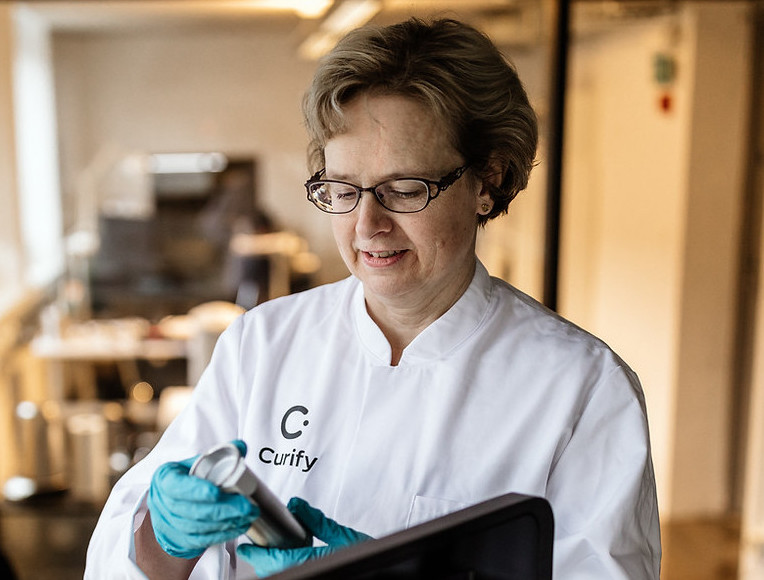Pharmaceutical customization technology developer CurifyLabs has partnered with food printing firm Natural Machines with the aim of bringing a new low-cost drug 3D printer to market.
Working together, the companies say they’ve developed a “pharma-compliant’ system that offers a more efficient, automated alternative to the compounding process used to create personalized medicines. Expected to launch later in 2022, the 3D printer is set to be central to a new service, which offers to help pharmacies and hospitals customize drugs at a more rapid pace than ever before.
“With this partnership, we are developing a unique Medicine-as-a-Service concept for pharmacy compounding, and we believe that our partnership with Natural Machines will bring an affordable and superior 3D printing platform to market,” says Charlotta Topelius, CEO of CurifyLabs. “Together we can revolutionize the industry within personalized medicine offering localized, on-demand drug manufacturing.”

Automating drug formulation
Natural Machines and CurifyLabs’ upcoming 3D printer has been built around the technology of the latter. Initially developed as part of a decade-long research project by Niklas Sandler Topelius at Åbo Akademi University, Finland, the firm’s TailoredCure process is designed to rapidly yield custom medications, both for human and veterinary applications.
Although the mechanics of CurifyLabs’ approach haven’t been made public, it’s understood to automate compounding, a procedure in which drugs are combined, mixed or altered to create personalized medicines. In doing so, the firm says that its technology eliminates the human errors that can creep into manual processes, and ensures the “compliant manufacturing” of “pharma-grade” drugs.
The company also highlights how this streamlined workflow reduces the need for pharmacy personnel and frontline care providers to handle active pharmaceutical ingredients (APIs), which can cause them toxic effects if overexposed, while its customization options allow it to address patients’ dosing, form and flavor needs.
Since CurifyLabs was founded in 2020, the firm has integrated its technology into a MiniLab platform, which effectively reduces manual elements of the compounding process by as much as 72%. According to the company, its system is suited to pharmacy, hospital and veterinary deployment, and is already being used to serve patients “in many countries” by clients like the Finnish Oulu Central Pharmacy.
“In veterinary medicine, it is common to split tablets in small pieces,” explains Samuli Ojala, a Pharmacist at Oulu Central Pharmacy. “Try splitting a tablet in five or seven pieces! Taste masking options allow better treatment efficacy, and can be used when technology enables this. In Finland we have a long tradition and a lot of knowledge when it comes to drug compounding, and I’m proud to be part of introducing new technology which enables personalized treatments.”

Expanding into drug 3D printing
Compared to CurifyLabs and its background within drug formulation, Natural Machines’ prior work has been targeted towards a slightly different market: customized edibles. Featuring a built-in precision control system, the firm’s flagship Foodini device is designed to push foodstuffs through a nozzle with high accuracy, enabling users to ‘print’ them into desired shapes.
When stacked layer-by-layer, these structures can be built into creative 3D designs, ranging from center pieces to garnishes, that Natural Machines says can be uploaded to an app and downloaded at will to “augment and elevate” meals.
Now, through working with CurifyLabs, the company intends to build out its portfolio into the pharmaceutical field. Between them, the firms are currently in the process of developing a new platform that’s capable of producing personalized drugs for patients, specifically targeted towards those let down by existing medicines.
Having demonstrated this machine’s efficacy during initial trials, CurifyLabs CSO, Niklas Sandler Topelius, says that it’s continuing to “adapt the technology” ahead of launch, but is still expecting to commercialize the technology later this year.
“At Natural Machines, we have solutions for the food sector and the personal care industry, and now with this strategic partnership we add the pharmaceutical field,” adds Emilio Sepulveda, CEO of Natural Machines. “This partnership will leverage both CurifyLabs’ experience and latest developments in pharma with our extensive 3D printing expertise, providing a new solution that aligns with the growing global trend of product personalization.”

AM’s drug customization potential
In the pharmaceutical sector, additive manufacturing is increasingly being used to create custom medications that can be tailored specifically to meet patients’ needs. Aprecia has become one of the early leaders in this area, having developed ZipDose 3D printing, a process it uses to produce the fast-dissolving FDA-approved Spritam tablet.
Similarly, FabRx, which specializes in pharmaceutical additive manufacturing, has worked with researchers to develop a means of rapidly 3D printing paracetamol. Unveiled earlier this month, the team’s volumetric production approach is said to enable the fabrication of custom drug-loaded tablets within a matter of seconds for use within labs and some clinical settings.
At a more experimental level, researchers based in Pakistan have also previously shown how 3D printing can be used to create pills with enhanced dosage control. By FDM printing tablets of equal size, but with varying percentages of infill and drug concentration, the team were able to develop antibiotics with a controllable release rate, which were said to have the potential to improve patient survivability.

Leave A Comment